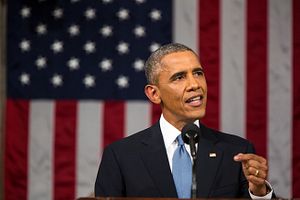Ah, the State of the Union address – that special time each year when analysts spend hours and hours pouring over a speech that will likely have little to no relationship to actual government policy. Fortunately, I can beg off from most of that tedium by virtue of working for an international affairs magazine. In fact, as of yesterday evening I had no plans to write about the speech at all – unless, of course, Obama said something particularly interesting or relevant to U.S.-China relations. And so he did, and here we are.
The passage in question reads as follows:
But as we speak, China wants to write the rules for the world’s fastest-growing region. That would put our workers and our businesses at a disadvantage. Why would we let that happen? We should write those rules. We should level the playing field. That’s why I’m asking both parties to give me trade promotion authority to protect American workers, with strong new trade deals from Asia to Europe that aren’t just free, but are also fair. It’s the right thing to do.
There’s a lot going on here that, unfortunately, will reinforce some of the darker suspicions among Chinese officials. Let’s unpack this paragraph, shall we?
First, Obama holds up a stark zero-sum vision of Asia-Pacific trade – something not likely to sit well in Beijing, where leaders constantly bemoan “Cold War thinking” in Washington. If China gets to “write the rules” for Asia-Pacific trade, Obama argues, U.S. companies and workers will be “at a disadvantage.” The underlying assumption is that a Chinese-led system will be inherently bad for the U.S., and (presumably) vice versa, with a U.S.-led system giving its companies an advantage over their Chinese competitors.
The response from China’s foreign ministry was to double-down on Beijing’s model, which stresses cooperation rather than competition. In the words of spokesperson Hua Chunying, “We hope every party, through a common effort, will provide a fair, open, and transparent environment for economic cooperation and make a contribution to perfecting world trade regulations.” Hua also emphasized China’s position of prioritizing “mutual benefits and win-win” cooperation when it comes to trade. Analysts often argue over how sincere China is in its formulation of “win-win” cooperation, but there’s no denying this is Beijing’s preferred rhetoric. To see the possibility of “win-win” cooperation on economic issues tossed aside in favor of an I-win-you-lose formula is troubling for China.
Second, another phrase that’s likely to grab Beijing’s attention (and not in a good way) is Obama’s rhetorical question, “Why would we let that happen?” This comes, of course, with the unspoken corollary that the U.S. can choose not to let China have its say in the rules that will govern future trade in the Asia-Pacific – China’s own backyard. This sentence speaks directly to a deep-seated fear in Beijing that the U.S. will never willingly cede any portion of its leadership to China, regardless of how powerful (or even well-behaved) China is. By asking “Why would we let that happen?” Obama is essentially saying: If I have my way, this will not happen. China will not be allowed to “write the rules” or set the agenda for Asia-Pacific trade.
In other words, Obama just provided fresh fodder for every Chinese analyst who sincerely believes the U.S. will do its utmost to “contain” China for as long as possible. In saying “we [the U.S.] should write those rules,” Obama is of course speaking to a domestic audience, but he should also be well aware that observers around the globe are listening. That assumption that the U.S. “should” lead, simply by virtue of being the U.S., is problematic for many countries, not just China. But China, with its new initiatives to create Asian-only (and Chinese-led) economic and security blocs, is perhaps doing more than any other country to turn this assumption on its head.
Third, Obama ties this confrontational rhetoric to the Trans-Pacific Partnership (TPP). Specially, Obama argues that he needs trade promotion authority so that negotiations can proceed on “strong new trade deals from Asia to Europe.” When it comes to Asia, that can only mean the vaunted TPP, Washington’s vision for a “high-standard” trade agreement that includes rigorous intellectual property rights and free trade requirements (including restrictions on state-owned enterprises). China stands little chance of meeting those standards and is thus excluded from the negotiations (which currently include 12 countries: Australia, Brunei, Canada, Chile, Japan, Malaysia, Mexico, New Zealand, Peru, Singapore, the U.S., and Vietnam).
China analysts have long looked askance at the TPP, reading it as another attempt at economic containment by the U.S. Recently, however, there were signs of a shift in position, with some Chinese officials even floating the notion of China eventually joining the trade pact. However, Obama’s State of the Union address will reinforce the negative perceptions some Chinese analysts have of the TPP – that it’s an American-led trade bloc made to serve narrow American interests. By pushing through the TPP, Obama implies, the U.S. can keep China from creating rules of trade that complement its own strengths and weaknesses.
Now, a caveat: Obama is speaking here to a recalcitrant Congress, one that so far has been reluctant to grant him the trade promotion authority he needs to seal massive trade deals in Asia and Europe. A little fear-mongering is a time-honored way of providing a nudge to legislators that aren’t quite on the same page as the White House. His speech doesn’t mean an end to U.S.-China economic cooperation, particularly on the bilateral front.
However, the world view presented in the SOTU is still profoundly disturbing from a Chinese perspective. China has long complained that it shouldn’t be required to “play by the rules” if it has no say in determining what “the rules” are. Now, even the chance to “write the rules” is being reserved for America alone. What are pundits in Beijing to make of that?

































